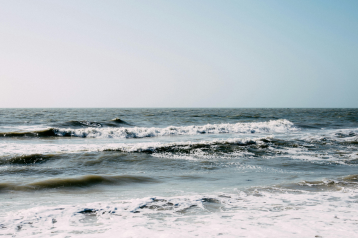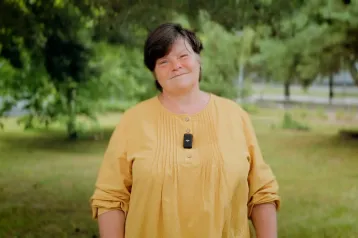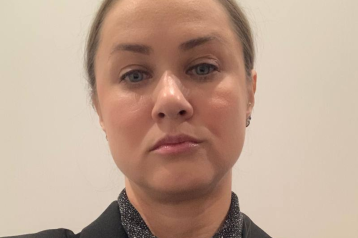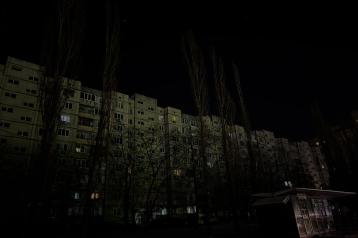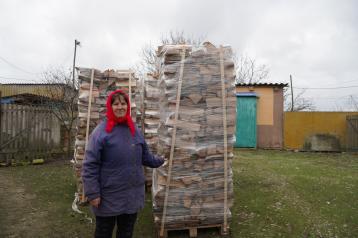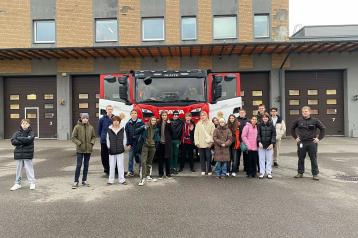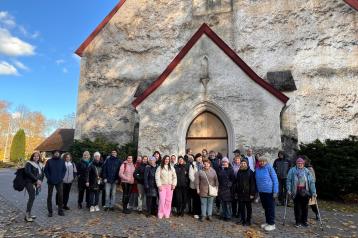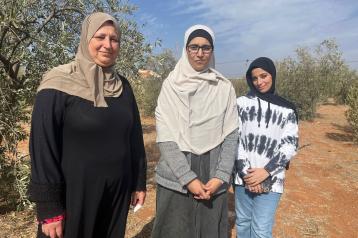Countries
- We are organising an international humanitarian conference in Tallinn on 6 November, and registration is still open. This year, the conference will focus on institutional reforms and the funding crisis, the digital transformation, and access to crisis affected communities.
- We opened an office in Syria to support people affected by the civil war and help them rebuild their lives.
- Despite the ongoing hostilities in Gaza throughout September, we managed to deliver 2,900 food portions to local hospitals. We continue to collect donations in Estonia to provide essential food aid that gives patients strength to recover and supports doctors and nurses in their vital work. Make a donation on the Estonian Refugee Council website.
- In Estonia, we kicked off the new season of Start Smart training on AI, with 40 young people with refugee backgrounds taking part.
- Since spring, we have supported more than 2,400 people through our mental health helpline. The helpline is available to Ukrainians both in Ukraine and across other European countries, providing much-needed support to those affected by the war.
- We opened hydroponic greenhouses at three schools in Armenia to help address the impacts of climate change and ensure food security in water-scarce conditions. The greenhouses also promote environmental education for children and strengthen social inclusion.
- We supported more than 390 Ukrainian refugees in Georgia with cash-based humanitarian aid to help them cover their basic needs.
Ukraine
We provide cash assistance, which allows people affected by the war to purchase food, medicines, hygiene products, and other essentials. As of now, we have provided cash-based assistance to more than 314,000 conflict-affected people, worth more than 58.4 million euros. Cash assistance is provided for three months, with the support of 3600 Ukrainian hryvnias per household member per month, equivalent to about 80 euros. Registration for assistance is carried out through Estonian Refugee Council's local registration points or via the online application platform. Currently, our focus is on assisting those in need in frontline areas in Zaporizhzhia, Donetsk, Luhansk, Kharkiv, and Kherson oblasts. The programme is supported by the European Union, the US Government, and the Estonian Ministry of Foreign Affairs. Acted is the lead partner for EU and US-supported projects.
We are supporting both new and existing businesses across five regions – Poltava, Kirovohrad, Cherkasy, Dnipro, and Kharkiv through a self-employment programme which allows people to take part in online business trainings, get mentoring support and receive business micro-grants. In September, 306 business leaders participated in 17 business training sessions on finance, pricing, marketing strategy, legal issues, team management, leadership, international markets, business plan presentation. Next step is business plan evaluation in October, with the strongest to move forward with mentorship and business grants. The project is developed in partnership with WEBPROMO and supported by the US Government.
We support livelihoods related to agriculture, livestock, food production, and various services through emergency assistance, with the aim of strengthening people’s self-reliance. The amount of support is around 700 euros. In September, we provided cash-based grants to 120 families from Poltavska, Kirovohradska, Cherkasy, Zaporizska oblasts. The programme is funded by the European Union, US Government, and the Ministry of Foreign Affairs of Estonia.
This winter, we will assist over 5,000 vulnerable families with heating aid. We are providing both financial and in-kind support to help cover rising heating costs and ensure fuel supplies for the winter. Distribution began in October, focusing on frontline and hard-to-reach areas in Eastern and Southern Ukraine, specifically in Donetsk, Kharkiv, Kherson, Luhansk, and Zaporizhzhia oblasts, where intensified hostilities and damaged infrastructure have severely hindered people's ability to meet their basic winter heating needs. The programme is supported by the European Union, the US Government, the United Nations Office for the Coordination of Humanitarian Affairs (OCHA) through the Ukraine Humanitarian Fund (UHF), and the Estonian Ministry of Foreign Affairs. Acted is the lead partner for EU and US-supported projects. National NGOs Shchedryk and Peaceful Heaven of Kharkiv are the sub-implementing partners for the UHF project.
We provide psychosocial support via a mental health hotline for Ukrainians living both in Ukraine and abroad to support the people affected by the war. In the past five months more than 2,400 calls have been made on the hotline. The work of the NPA Psychological Hotline is implemented in partnership with the National Psychological Association of Ukraine and made possible thanks to funding from ESTDEV – Estonian Centre for International Development.
Estonia
On 6 November, we are hosting an international humanitarian conference in Tallinn. This year’s programme focuses on three key themes: institutional reform and the funding crisis, digital transformation, and access to crisis-affected communities. The conference will feature speakers from leading international organisations, including Tammam Aloudat (The New Humanitarian), Hans Das (ECHO), Patrick Vinck (Harvard Humanitarian Initiative, KoBo), Tristan Ferraro (ICRC), and Hani Almadhoun (Gaza Soup Kitchen). The conference is supported by ESTDEV – the Estonian Centre for International Development Cooperation.
At the end of September, the kick off event of the Start Smart training on AI for young people with refugee and migrant backgrounds took place. The autumn programme, which involves 40 participants, will run until 6 November. The training is part of an entrepreneurship programme carried out in cooperation with Haaga-Helia University of Applied Sciences in Finland, aimed at strengthening the entrepreneurial competitiveness of people with refugee backgrounds through learning about artificial intelligence. Start Smart entrepreneurship training programme is part of UPBEAT project. Project partners are Haaga-Helia University of Applied Sciences, Startup Refugees and Estonian Refugee Council. The project is co-funded by the European Union, through the Interreg Central Baltic Programme.
Through the Language Ladder programme, we support Ukrainian refugee youth in language learning and social integration. Activities started in October. Read more on the website of the Estonian Refugee Council. The project is being implemented in collaboration with Tallinn University and the Polish organisation Dobra Fabryka. Funded by the European Union. Views and opinions expressed are however those of the author(s) only and do not necessarily reflect those of the European Union or European Social Fund Agency. Neither the European Union nor the Granting Authority can be held responsible for them.
We conduct monthly adaptation support training sessions on various subjects, including use of e-services, parenting, education system, adaptation of pensioners, legal matters, entrepreneurship, medical and social system, labour market, as well as legal foundations and residence permits. The training sessions take place across Estonia, both in face-to-face and online formats. In September, 225 people took part in training sessions. This continues to demonstrate the need for information among people who have fled the war to Estonia regarding the various legal grounds for staying in the country, in light of potential future legislative changes. Since 2022, a total of nearly 12,000 people have participated.
We provide counselling by appointment at the Estonian Refugee Council office (Vambola 6, Tallinn) every day from 10 am to 5 pm. Our information hotline is open to all refugees, as well as institutions and individuals assisting them, at +372 5881 1311 (Monday to Friday from 10 am to 5 pm), and via email at counselling@pagulasabi.ee. Additionally, counselling services are available on Viber, WhatsApp, and Telegram at +372 5464 0007.
We organise regular group activities and community events across Estonia. In Seotember, more than 200 people took part in community activities across Estonia. We organised various events across Estonia to support language learning, social interaction, and community integration. For example, people in Narva took part in the Station Narva festival, a cooking workshop was held in Rakvere, language cafés continued in Tallinn, and youth group meetings carried on as usual. Community activities are supported by UNHCR, the UN Refugee Agency.
We are running the MindSpring group based programme for people with refugee backgrounds to help them adjust to life in a new country. In September, the final group for parents started, eight Ukrainian women are taking part. Group meetings take place over six consecutive weeks. In October, two new groups for young people will be launched. The programme is being implemented with the support of the Estonian Ecumenical Relief Organization (EERO Canada), funded by donations collected in Canada and the United States.
In cooperation with the Integration Foundation, we are launching training activities to strengthen the capacity of local governments in the fields of migration and integration. The next migration seminars will take place on 4 November in Rakvere and on 19 November in Jõhvi. In total, 20 training sessions are planned across Estonia. The project is co-funded by the European Union through the Asylum, Migration and Integration Fund (AMIF) and the Ministry of the Interior.
In cooperation with the Integration Foundation, we are launching joint activities across Estonia aimed at increasing the social engagement, trust and understanding of third-country nationals, including beneficiaries of international protection. In September, the first events took place in Narva and Tallinn, providing practical advice on maintaining mental well-being and demonstrating how to give first aid. Project no. AMIF.1.02.23-0005 “Cooperation activities to increase the civic engagement of third-country nationals, including beneficiaries of international protection” is co-funded by the Asylum, Migration and Integration Fund (AMIF).
Armenia
In three Tavush region schools three hydroponic greenhouses were officially opened at the end of September to support the adoption of water- and energy-efficient agricultural solutions and help the schools cope with the impacts of climate change and ensure food security in water-scarce conditions. More than 400 students now have access to learning about sustainable agriculture, supported by project-based learning modules developed by our team. There’s a designated greenhouse staff that coordinates and oversees the setting up and managing hydroponic greenhouses, composting systems, and energy-efficient agricultural practices with the support provided by experts from our project partner Estonian University of Life Sciences. The programme is funded by the Ministry of Climate of the Republic of Estonia.
Thanks to funding from the European Union, we are launching four community councils in Armenia to enable people with refugee backgrounds to voice their concerns, advocate for solutions to their problems, and take part in decision-making processes that affect them. The call to join was officially launched nationwide in September, with around 180 applications received. The meetings will kick off in October. Similar councils have been previously established in Estonia and Georgia. We are also running self-help groups that support the mental well-being of people with a refugee background and provide them with practical skills and support to start or restore small businesses and secure sustainable livelihoods. In September, 14 grants were issued: eight people from Dilijan and six from Hrazdan. Mentors continued providing support to the previous 13 grantees. Two new groups were established in Ararat and Ejmiatsin, where we also arranged childcare to ensure everyone interested could join the sessions. The programme is funded by the European Union.
Georgia
We continue strengthening local NGOs and civil society organisations in Georgia. The programme enhances their ability to address regulatory challenges, secure the funding needed for operations, and promote cooperation between different regions. In September, we launched training sessions that promoted active participation. The topics covered: regulatory compliance, monitoring and evaluation, and human resources. Two more training sessions are scheduled for October.
We support Ukrainian refugees in Georgia through cash-based humanitarian assistance. Each eligible household will receive one-off support of 265 GEL (approximately 93 euros) per person, for up to three family members. The project is now finalised, reaching more than 390 people across the country.
We will support Ukrainian refugees living in Georgia this winter period with cash based humanitarian assistance in meeting basic winter-related needs.
Jordan
In Jordan, we support the self-reliance of vulnerable women-led households through smart and climate-friendly agricultural practices. At the same time, we are providing hydroponics training to four women-led community organisations to increase knowledge of water-efficient farming methods across the region. Forty Syrian refugee and local community women have completed agriculture-focused training, gaining essential knowledge, developing practical farming skills, and being motivated to generate their own livelihoods. We are able to provide support to 12 of these women to establish hydroponic greenhouses on their home plots to enable them to grow food for their families or earn an income by selling the produce. The activities of the Estonian Refugee Council in Jordan are supported by ESTDEV – Estonian Centre for International Development.
Syria
We registered an office in Syria to support people affected by the civil war and help them rebuild their lives. We are providing cash based humanitarian aid to Latakia city to help fight the consequences of the wildfires. 65 families will receive emergency cash support for a two month period. The programme is funded by the Estonian Ministry of Foreign Affairs and implemented in partnership with Finn Church Aid.
Occupied Palestinian territories
We started collecting donations in Estonia to provide critical food aid to people in the Gaza Strip. In cooperation with Gaza Soup Kitchen, we are distributing food in four hospitals in Gaza, supporting both patients receiving treatment and the medical staff who work there to save lives. Despite the ongoing hostilities in September we were able to deliver 2,900 meal boxes. Donations can be made through the Estonian Refugee Council’s donation platform. More information is available on the Estonian Refugee Council website.
